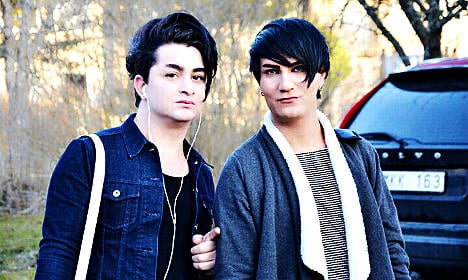“I was always in danger. Mostly I was bullied and harassed, but I was also raped several times,” Sirwan tells The Local.
People spat at her and wondered if she didn’t have brothers or a father to kill her.
She did, in fact, have a dad and a brother, and they hated that Sirwan played with girls and cared more about manicures than manliness.
“They used to hit me, a lot. Every day.”
At school she was ostracized, but adults posed by far the greater threat.
One day, she recalls, a group of ten men threatened her with guns and truncheons and took her to an abandoned building.
“They raped me, all of them,” she says.
And it wasn’t a one-off.
“Others stopped me on the street and raped me in their cars.”
In 2012 a police unit hauled her away because they thought her clothing was too feminine. They interrogated her about her sex life, forced her to undress, and put her in solitary confinement.
In the end her resistance faded. She told them everything they wanted to know about how she'd had sex with a lover who had fled to Turkey. The police recorded the conversation and played it back to her family.
The men in her extended family thought she should be killed for the dishonour she had brought on them.
Only her mother sympathized, telling Sirwan she cared only that she was her child, and didn't mind that she saw herself as a young woman.
After six months Sirwan was freed on parole. Her mother brought her money and a passport and told her never to come home.
A televised disguise
Karwan’s childhood was similarly grim.
Her brother routinely locked her in her room and her father once burned all her books to stop her going to school and bringing more shame on the family.
But Karwan liked to sing and dreamt of stardom. She secretly applied to appear on a TV talent show, and was accepted.
Disguised in a dress and blue wig, she sang a Persian song. And the disguise worked, but only once.
The second time she sang her family recognized her, and it was time to scram.
“Promptly and without even thinking I fled Erbil for the city of Sulaymaniyah,” she says.
Her family were so incensed they went to the TV station and threatened to burn the building down if Karwan ever performed again.
To make her personal tragedy worse, the entire incident proved so unsettling that “my mum died of shock and horror”.
After three months in Sulaymaniyah she crossed into Turkey. There her family phoned her and said they wouldn’t kill her if she came back, they would “just” cut off her tongue and ears. She wasn’t going back.
An Istanbul reunion
Sirwan reached Istanbul in September 2014. She slept in public parks and was permanently cold, but relatively safe.
One night in a club she met a transgender Iraqi who put a roof over her head.
“Then I built a network of friendships and kept hanging out with them until I met Karwan…”
They met by chance. Like Sirwan a year earlier, Karwan was now sleeping on park benches and didn’t have money or a job. They bumped into each other when Sirwan was walking through the park that Karwan now called home.

They quickly decided to leave Turkey. Alhough their lives were better there, they were still seen as homosexuals and, by extension, second-class citizens.
“We found a smuggler who offered to take us by dinghy in September 2015, and he wanted €1,500 from each of us.”
“We managed to float using our life vests for about three hours. Four kids drowned that day. We were lucky, a ship came out of nowhere and took us to Greece.”
They were put in separate refugee camps and didn’t meet again until two months later, by which time they were both traumatized. In Turkey, they’d been able to choose their own company, but in Swedish asylum centres they were just a couple of gay Kurds, which made them a target.
By coincidence, they both wound up in Boden in northern Sweden, though in different shelters, and both say they faced serious harassment.
“Karwan called and said she wanted to commit suicide.”
But Sirwan talked her out of it and they hatched a plan to head for Stockholm.
They took a train to the capital in November 2015 and made a beeline for the UN tent at the central station. After explaining why they couldn’t go back to an asylum centre they were advised to go to a church.
“And there we met a guy called Mikael, and he has taken care of us,” says Sirwan.
Mikael ensured that they always had a bed for the night and eventually found them a room in a friend’s house.
Was Sweden the right destination?
Sometimes they regret coming to Sweden, says Sirwan. Iraqi Kurdistan is considered safe by the migration agency and they fear they could be sent back there.
“This guy spat on me and said, ‘you are shameful, how can you be Kurdish?’”
After a radio interview, she received threats from Kurds in Sweden who said they would kill her if they ever met her.
Stuck in this administrative limbo, it's hard for them to move on with their lives. They are on work training schemes but their job prospects are complicated by their uncertain asylum status.
As they wait and wait for their asylum application to be processed, Sirwan says she wants the Swedish authorities to understand that they didn’t come here for money.
“We came here to be free.”
But what if their cases are rejected?
“Then we’ll be totally screwed.”


 Please whitelist us to continue reading.
Please whitelist us to continue reading.